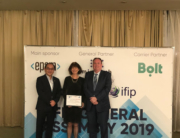The 14th IFIP TC9 Human Choice and Computers Conference: “Human-Centric Computing in a Data-Driven Society” has extended the deadline for submissions Until 21 February 2020.
To be held in Tokyo, Japan from 9-11 September 2020, HCC14 takes the theme: “People First : One Can Hide the Data but Not the Truth”
We are now living in a “data-driven society”. Data is seen as the source of value in the new digital age and creates added value for growth. The development of IoT especially enables the collection of enormous amounts of data in a range of ways and a variety of forms which can spread around the world. Data utilization is likely to continue to expand and become more and more important across all sectors of society, as the spread and penetration of automation unfolds in the coming years.
All those engaged with trying to shape the technologies of today are in some sense oriented toward the future. Is the future bright? And if so who and what will make it so – and for whom? As individuals and as team members, vision and ingenuity are needed to help us realize a positive future for all.
In a data-driven society, all our choices, actions, locations, emotions, and behaviours are monitored, measured, interpreted, compared, and rated. While data is sometimes called the new oil, also this form of extraction comes with its challenges. In a data-driven society, existing inequalities can be deepened rather than solved (e.g., preventing policing, access to health insurance). While oil was a driver for economic growth, its negative effects on our planet and biosphere remained for long invisible. This time we should do better and investigate not only data as a driver of growth, but also as a driver of change we may not want to see.
The IT Industry is recognizing that a healthy employee work/life balance is essential for long-term enthusiasm and success. It is clear that a strong architectural plan with input from all stakeholders creates a vastly different, participative and delivery-focused working environment. The continued commitment to creating excellence and an atmosphere that embraces change should be the foundational characteristics of the IT Industry in the future. Treating people like they are human beings rather than automata to extract value from, is a concept that should be back in fashion.
The digital traces one leaves behind each day reveal more than one knows, and such data is increasingly being used to aid organizations in swaying public opinion (cf. Cambridge Analytica and the Brexit vote/US Elections/India).As the scandals of Surveillance Capitalism (fake news makes more money) come face-to-face with true human development needs, and the ever-sharpening focus on the need for sustainable solutions, change is needed. It is also paramount to remember, moreover, that our conceptions of being human and hence what we understand within a particular cultural / historical context vary significantly from culture to culture, whilst our notion of what we consider as being human is being increasingly shaped by the technologies that we use.
The coming together of Computing, Control and Communications is resulting in several unforeseen outcomes that are beginning to make “Being Human” more and more of a challenge. It is no more a trilogy of human–centric, technology–centric and data-centric practices both in Data Management and Software Engineering. Humanizing in this context entails Privacy, Safety, Security, Human Relationships and Personal Growth; it requires new governance models for new data economy ecosystems. This is proving to be both an answer and a challenge to the productivity paradox in IT and the goal of achieving a positive future.
Human : Machine :: Efficacy : Effectiveness
Data-driven innovations, in short, are increasingly understood as only being successful and fit for purpose if they are favorable for all humanity, and not simply designed to fulfil the priorities of monopolisation and the concentration of wealth in ever fewer hands. Research into these and related issues needs to straddle multiple areas of academic studies, following the principle that technology must be of benefit to humanity and fostering faith in humanity at large is at its foundation.
Since 1974, the Human Choice and Computers (HCC) conference series has consistently fostered innovative thinking about the interfaces between society and technology. At this time, HCC14 in 2020 focuses on “Human-Centric Computing in a Data-Driven Society” and welcomes inputs from members of academia and research, civic society, computing associations, industry, and the IT professions on the following (and related) themes:
- Developing New Technologies Using Data for Human Society.
- Ethical and Legal Issues for Data Analytics and Big Data.
- Social Accountability and Responsibility for Computing and Data Utilization.
- Data-work in relation to Gender and Diversity, Work, Educational and Daily Life.
- How data helps to make the world a better place – with a demonstrable focus on the better, and where better is not the same as making organisations richer and CEOs more powerful.
- Harnessing Information with Unconscious Bias
- Legal Systems for Criminal Offences and Abuse
- Ethical governance models for new data economy ecosystems
- How did we get here? Precedents, and lessons from the past.
- How culturally diverse interpretations / understandings of life-work balance, of being human, and slow-tech and techno-feminist understandings of a data-driven society can help us shape a more human-centric computing environment
- Impact on International Security, Intelligence, and War.
- Environmental Impact of Big Data
- ICT for Development: Global Industries, Developing Economies, Sustainability.
- Analysis, design, construction, specification, development and testing of IT artefacts to defined deadlines and exacting standards
- Impact analysis of human endeavour and data analytics
- Security and privacy for big data and data analytics
- Using collaborative skills to work with team members in order to ensure reliability, availability and performance of applications
- Connectivity/digitalization affecting our working and/or private lives
- The view of human nature in a data-driven society
HCC14 will also welcome co-located TC9 Working Group Workshops
==============================================================
Working Group 9.1: Computers and Work – 10th CNoW: Int’l Workshop on Changing Nature of Work with ICT
AI in the Workplace: Navigating the Age of Digital Automation
With the Internet and abundant smart devices, the paradigm of computing now turns into a new world of digital automation with the strong presence of AI in the workplace (Davenport & Kirby, 2015; Genpact, 2018). People expect AI might replace or displace humans from current jobs in the near future, and that AI will multiply the cognitive and analytic powers of machines and augment or displace human capacities (Robinson & Bogen, 2017; Tito, 2017). Decision support, and robots controlling intelligence augmentation have been used at work, but the larger scale of novel AI applications based on deep learning technologies and underlying bigdata constitute a new challenge. In this context, this workshop takes the view of real – human – workers. AI in the workplace will present opportunities as well as challenges for modern day organizations. These opportunities and challenges include changes in work practices including social and institutional aspects as well as business models. In this workshop, therefore, we are aiming to identify the changes that are and will be occurring in the work environment, work routines, related policies, and business models. Other softer side issues involved in shifting towards AI are also welcome. In this regard, this workshop aims at explicating cases and theories concerning visions of AI replacing functions and activities, as well as insightful frameworks of AI, shape and patterns in AI platforms, and/or smart offices enabled by AI technologies. The scope will be shaped by the imaginations of participants’ creative contributions to the topic.
Submissions of manuscripts dealing with interdisciplinary issues across political and strategic lines, as well as social and technological issues, are strongly encouraged.
Working Group 9.2: Social Accountability and Computing
To share or not to share – Social responsibility to share health related information.
There has been much active discourse concerning why people’s privacy should be protected and what are the rights of patients related to their health information. However, this is an issue that also needs to be looked at from the viewpoint of social responsibility, because health information does not have value only for the person sharing it but also for common good. While privacy arguments for protecting health related information are valuable, the aim is to enlarge the discussion to other, less individualistically oriented, approaches. This workshop will explore various openings to both sides: To share or not to share.
Submissions related to health information, privacy, social accountability and responsible research and innovation are warmly welcomed!”
Working Group 9.5: Our Digital Lives
Given the prevalence of connectivity and digital work in its various forms, in this workshop we are interested in studies (including work-in-progress) exploring any aspect of ‘Our Digital Lives’ following our Working Group’s general theme. Example topics include (but are not limited to): digital work in its social context, digital health, digital education, digital labour, digital games, digital tourism, online communities, social media, augmented or virtual reality, emerging technologies, or artificial intelligence.
Submissions are welcomed that offer fresh theoretical or empirical insights into how our digital lives have transformed the way we work, communicate, and play together.
Working Group 9.8: Gender, Diversity and ICT
WG 9.8 calls for papers that explore work that unfolds with and around data; that is, work that takes place in the very collection, use, and undertakings of and on data (Fisher et al. 2017, Bossen et al. 2019) – including the often invisible forms of work (e.g. Star and Strauss 1999). With this, we are interested in studies that explore the resources (social, cultural, material, digital) that are mobilized for digital data to serve in work, educational settings, and/or daily life. We are interested in the topic from perspectives of gender and diversity and call for papers that bring feminist concerns into the analyses and e.g. explore instances of data bias (Perez 2019) in such particular work. At the same time, we welcome papers on other topics related to gender and diversity.
Paper Submission
================
The conference is open to attendees at all stages of career and education, whether you are at the start, middle or peak of your career, either as academics or practitioners. Submitted papers should be approximately 3,000-5,000 words in length. Please return your paper, using the appropriate format, through hhttp://www.hcc14.net/ or https://easychair.org/cfp/HCC14
The Easychair Submission Link: https://easychair.org/conferences/?conf=hcc14
Please be sure to indicate whether you are submitting to the conference general theme, or to one of three specific workshops. Papers must be anonymized for blind peer review.
Chairs
=======
Conference Chair: Taro Komukai
Program Committee Chairs: Taro Komukai, David Kreps, Gopal TV, Kaori Ishii
Organizing Committee Chair: Kaori Ishii
Main Editor: David Kreps
Co-Editors: Taro Komukai, Gopal TV, Kaori Ishii
Workshop Chairs: WG9.1 Jungwo Lee; WG9.2 Jani Koskinen; WG9.5 Petros Chamakiotis and Brad McKenna; WG9.8 Sisse Finken, Johanna Sefyrin and Charles Ess.
Important Dates
===============
February 21, 2020 – EXTENDED DEADLINE Submissions due
March 31, 2020 – Notification of acceptance/rejection
April 30, 2020 – Submission of camera-ready papers
July 31, 2020 – Deadline for early bird registration
September 9 – 11, 2020 – Conference dates.
Digital Equity Committee Funding
================================
Funds are available to support PhD students from developing countries to attend HCC14 or one of the WG Workshops if an application to the IFIP Digital Equity Committee is made through the Chair of Technical Committee 9, David Kreps. Please see http://www.ifiptc9.org/






